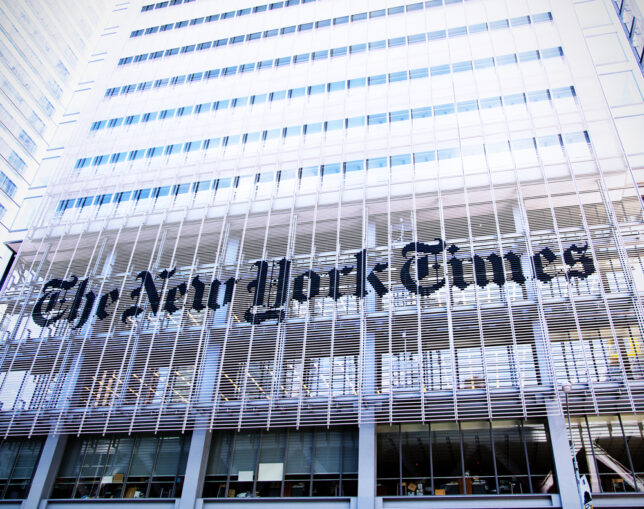Labor Watch
Pushback to Social Justice Unionism at the New York Times
 Credit: Erika Cross. License: Shutterstock.
Credit: Erika Cross. License: Shutterstock.

The shock troops of social justice unionism, the project that aligns labor unionism with the full spectrum of left-wing ideology, have been the writers’ unions at major media outlets. They are typically affiliated with the NewsGuild, a division of the socialist-aligned Communications Workers of America union. But in a recent controversy at the New York Times, NewsGuild members are pushing back against the most extreme cases of social justice unionism, at least when it directly targets the members of the union.
Letters, Letters Everywhere
The fracas started with an open letter signed by roughly 200 Times contributors, including a handful of staff journalists criticizing the newspaper for its right-deviationist crimethink on matters concerning gender reassignment, especially of minors. At the same time, 130 LGBT activist groups led by GLAAD and the Human Rights Campaign issued a separate open letter to the Times demanding the paper cease publishing crimethink, subject itself to a struggle session with “trans community leaders,” and appoint “at least four trans writers and editors within three months.”
Given the Times’s allegiance to social liberalism and history of giving in to activist pressure, many were surprised when senior Times editorial staff responded to the attacks by defending their reporting and demanding that journalists not take part in demonstrations “organized by advocacy groups” or “attacks on colleagues on social media and other public forums.”
That defense provoked the ire of the leadership of the NewsGuild of New York, which readers may remember assisted the internal mob action against the Times’s now-former op-ed page editors after they published an article by U.S. Sen. Tom Cotton (R-AR) calling for harsh suppression of rioting during 2020. NewsGuild president Susan DeCarava wrote a letter to the Times asserting that the admonitions in the Times editors’ letter might violate union members’ rights to criticize workplace conditions. One might recall how NewsGuild reportedly coached the faction targeting the Cotton op-ed to assert the op-ed “puts Black @NYTimes staff in danger,” turning a political and editorial dispute into a “workplace” matter.
Hitting the Brakes
One might have expected, based on the experience with the Cotton op-ed, that the NewsGuild’s letter would be widely supported in the newsroom and would affirm the power of the internal mob, perhaps ousting another editor and compelling unconditional surrender to the demands of the radical transgender activists. But, perhaps because the union’s actions were directly threatening reporters’ ability to do their actual jobs, that did not happen.
Instead, dozens of Times reporters signed their own letter rebuking the NewsGuild that concluded:
Debates over fairness and accuracy are perfectly reasonable. We understand and respect that the Guild has an absolute duty to offer representation to members when they are subject to discipline by management. But we do not think it is the role of our union to be engaged in—and taking sides in—public debates over internal editorial decisions.
Our hope is that the coming days will bring more constructive internal dialogue among Times employees and with Guild leadership that can help unify and improve our news organization. And we ask that our union work to advance, not erode, our journalistic independence.
Placed on the back foot, the NewsGuild leadership issued a clarification that the Times’s coverage of transgender debates was “a matter of editorial policy about which the Guild does not take a position.”
Whither Social Justice Unionism?
The dispute at the Times concerns many issues and influences, among them the power of the organized LGBT lobbies, the position of the medical establishments of this and other countries, and the power of prominent media outlets like the Times to set the terms of debate in certain sectors of American society. But the debate within the Times itself, with management and a loud and prominent faction of journalists facing off against the union, raises another: What will become of social justice unionism in the coming years?
As the Cotton op-ed fracas demonstrated, culturally left-wing unions like the NewsGuild functioned as the tip of the spear enforcing the “woke” revolution. One can also see such incidents as the Chicago Tribune journalists’ union attacking a law-and-order columnist for accurate reporting and the Minneapolis Teachers Union subordinating teacher tenure—previously a sacrosanct benefit in teachers’ unionism—to de facto racial quotas as evidence for this. In this light, the recent campaigns toward unionizing congressional and state legislative staffs should be viewed as an attempt to coerce more than dues (which, under Janus v. AFSCME, can no longer be fully coerced in the government sector) out of dissenting (read: Republican) staffers.
But what happens when the membership says “No!” as the Times faction has done? The Times reporters are not anti-union; they are Guild members. It is reasonable to deduce from the broad tenor of Times reporting that few signers, if any, are ideologically conservative. But presented with social justice unionism conflicting with their view of their profession, the Times writers balked and sided with their professional obligations rather than ideological purity. Given the demonstrated power of the NewsGuild to enforce ideological purity, that is a bold stand.
The question that remains is whether change will come to the Guild itself and to the labor movement more widely. Ideologically heterodox defenders of organized labor have emphasized the potential strength of a labor movement that does not intervene in cultural politics, but instead represents workers’ economic interests. I have been and remain skeptical that the institutional structure of American labor unionism makes any change possible in the short or medium term. What comes of the Times reporters’ dissent will matter far beyond the walls of the Gray Lady.



